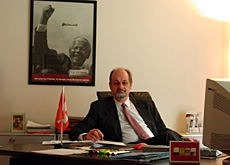New ambassador sees way forward for South Africa

Switzerland is sending a new ambassador to South Africa, which is celebrating its tenth anniversary as a democratic nation.
In an interview with swissinfo, diplomat Viktor Christen says Pretoria has an important role to play in helping with the development of its poorer neighbours.
Christen takes up his post on September 1 after four years as head of the Swiss mission in Colombia.
He arrives in South Africa at a time of political stability ushered in by the country’s parliamentary elections in April.
However, the legacy of apartheid is still apparent in the large economic and social gap which divides the country.
swissinfo: You have just spent more than four years in Colombia. Can you describe your experience there?
Viktor Christen: It’s a country embroiled in a long-running civil war. Through various initiatives, Switzerland has attempted to reduce tensions in the conflict.
swissinfo: You’ve exchanged a country mired in civil war for one with rampant crime, poverty and an Aids pandemic. Are you looking forward to your new post?
V.C.: Yes, very much. In the late 1990s, before I went to Colombia, I started a number of peace initiatives for South Africa.
I’m also motivated by the fact that I’m leaving a country at war to go to a country which has emerged from civil unrest and is now in a post-conflict phase. Of course, that doesn’t mean that all the problems have been solved.
swissinfo: What are the problems as you see them?
V.C.: Aids is the paramount problem, affecting the population in a way that one could not have foreseen ten years ago. About 70 per cent of Aids patients are concentrated in southern Africa.
swissinfo: What can Switzerland do?
V.C.: Switzerland is trying on two different levels to help South Africa. We are active in the field of prevention by supporting various projects, and we are also involved in looking for a cure.
We are party to the World Trade Organization agreement which outlines a method of cooperating with the South African government in this area.
Medicines that can extend victims’ lives are now handed out free of charge or at affordable prices.
swissinfo: South Africa has one of the highest crime rates in the world. Aren’t you afraid?
V.C.: Fear is not the right word. I’m certainly concerned about the situation, but just think about the country where I was last posted (laughs). In Bogotá, I had to drive around in an armoured vehicle, and could only walk somewhere if I had a police escort.
Security issues are in certain respects much simpler in South Africa than they are in Colombia, but the dangers are real and can’t be ignored.
You have to alter your lifestyle accordingly. My wife and I will try to make the best of the situation, which of course doesn’t do much to solve the problem. That’s why I’m pleased Switzerland is involved in projects to reduce the high crime rate.
swissinfo: It’s well known that Swiss companies had many business dealings in South Africa during apartheid, ignoring the worldwide sanctions against Pretoria. Given South Africa’s unemployment and poverty, shouldn’t Switzerland be doing more to help?
V.C.: That’s an important point which I can’t sidestep, if only because of the type of person I am. But I won’t be able to deal with that question until I have taken over my new responsibilities.
Switzerland is today the fifth largest investor in the country. And through the mandate given to the Swiss Organisation for Facilitating Investments by the Swiss State Secretariat for Economic Affairs, we are creating attractive investment opportunities in South Africa for small- and medium-size Swiss companies.
We are not just talking about the large multinational corporations, which everyone always mentions. Because the future of this country depends on small- and medium-size companies, just as it does for Switzerland. If Switzerland can have some success here, that would be in the interest of South Africa.
swissinfo: What positives do you see?
V.C.: I see South Africa in many respects as the pole on the southern half of the African continent. With its high degree of development and know-how, it’s only natural that it should play a key role in helping its poorer neighbours.
And South Africa is serious about taking on this responsibility, which it’s doing in cooperation with other countries in the region.
swissinfo: South Africa is a popular holiday destination. Are you looking forward to its beautiful scenery and landscapes?
V.C.: Travelling around in the host country is part of an ambassador’s job, even though this was very difficult to do in Colombia. I’m very much looking forward to exploring this beautiful country with my wife.
swissinfo-interview: Jean-Michel Berthoud
South Africa has a population of 45 million.
Switzerland invested SFr12.2 million ($9.6 million) in development aid to South Africa in 2003.
South Africa is celebrating its tenth anniversary as a democratic nation this year.
Despite the peaceful transition from apartheid to democracy, the country is beset by an Aids pandemic, high levels of poverty, unemployment and crime.
The new Swiss ambassador, Viktor Christen, took up his post in Pretoria on September 1.

In compliance with the JTI standards
More: SWI swissinfo.ch certified by the Journalism Trust Initiative











You can find an overview of ongoing debates with our journalists here . Please join us!
If you want to start a conversation about a topic raised in this article or want to report factual errors, email us at english@swissinfo.ch.